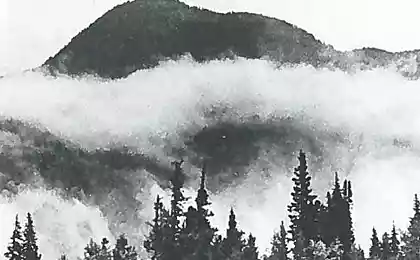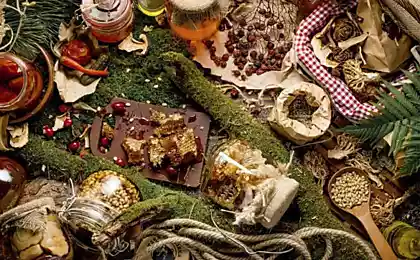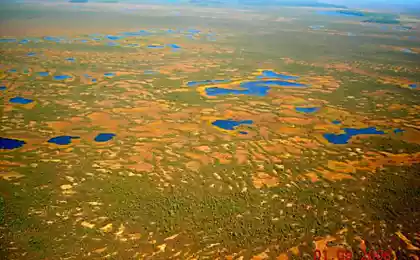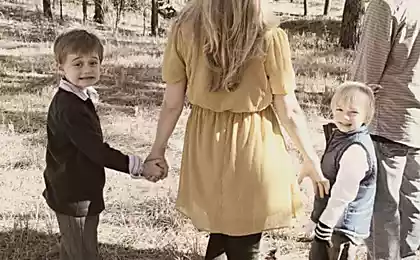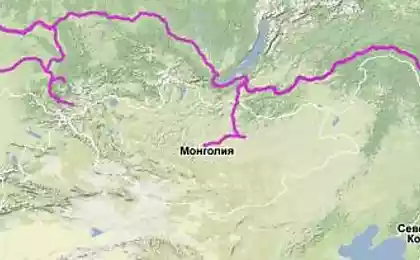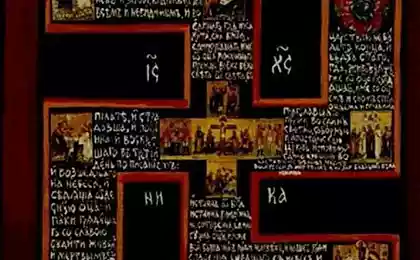698
In the wild: a family History, 40 years has lived in the forest without contact with the outside world
While humanity has survived world war II and launched the first space satellites, the family of Russian hermits struggled to survive by eating the bark and re-inventing the primitive tools of everyday life in the taiga for 250 miles to the nearest village.
Why they fled from civilization and how to survive a collision with it?
Thirteen million square kilometers of wild Siberian nature seem a little suitable place for life: the endless forests, rivers, wolves, bears, and almost complete solitude. But despite this, in 1978, flying over the taiga in search of a place for heading the teams of geologists, a helicopter pilot discovered here traces of human settlements. At a height of about 2 meters along the slope and near the unnamed tributary of the Abakan river, separating between pine and larch trees was a cleared area that served as a kitchen garden. This place never before explored Soviet archives about living here the people were silent, and the nearest village was more than 250 kilometers from the mountain. To believe that somebody lives in there, it was almost impossible.
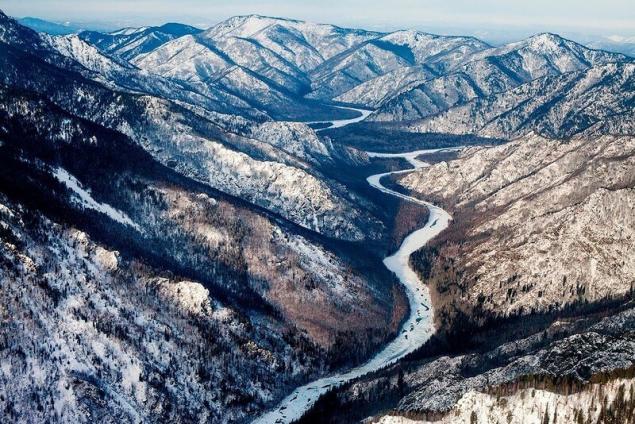
The gorge through which flows the river Abakan
After learning about the discovery of the pilot, a group of scientists sent here in search of iron ore, went off prospecting strangers in the forest could be a dangerous wild beast. Expanding on backpacks gifts for friends possible and in any case, checking the operation of the gun group led by geologist Galina Pismenskaya went to the site 15 kilometers from his camp.
The first meeting was exciting for both sides. When the researchers reached the goal, they saw a well-tended garden with potatoes, onions, turnips, and piles of rubbish around the taiga blackened by time and rain hut with a single window — sized pocket of a backpack. Pismenskaya recalled how from behind the door hesitantly and looked out the owner — an old man in an old shirt of burlap, patched trousers, with unkempt beard and disheveled hair, and, looking cautiously at the strangers, agreed to let them in the house.
The hut consisted of one cramped musty room, low, bloated and cold as a cellar. Her floor was covered in potato peelings and shells from the pine nuts, the ceiling was sagging. In such conditions for 40 years there lived five people.
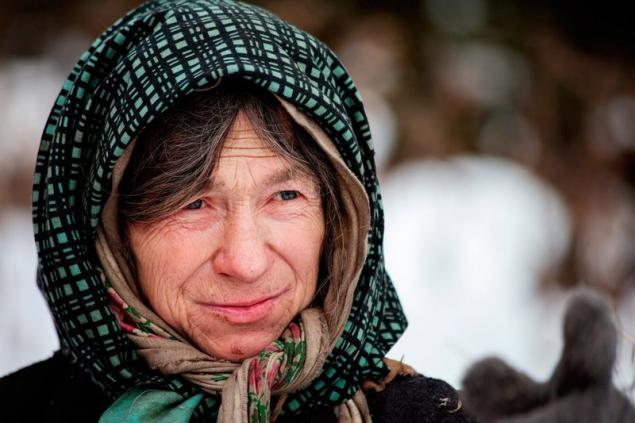
Agatha was the only survivor of a large family of reclusive old believers, was found by geologists in 1978 in the Western Sayan mountains. The Lykov family lived in isolation since 1937. For years, the hermits tried to protect the family from the influence of the external environment, especially in relation to faith
In addition to the head of the family, old man, Karp Lykov, in the house lived two of his daughters and two sons. For 17 years prior to the meeting with the scientists here died from exhaustion, their mother, Akulina. Although it Carp sounded clearly, his children already spoke on his tongue, the distorted life of isolation. "When the sisters talked among themselves, the sounds of their voice was like a slow muffled cooing," recalled Pismenskaya. Younger children, born in the forest, had never met other people, older ones have forgotten that once lived a different life. Meeting with the scientists led them into a frenzy. At first they refused any treats — jam, bread and tea — muttering: "We don't!" It turned out that the bread is there to see and once tried only the head of the family. But gradually when adjusted, the savages were used to all the new friends and learned about new tech products, the appearance of which missed. Cleared up and the story of their settlement in the forest.
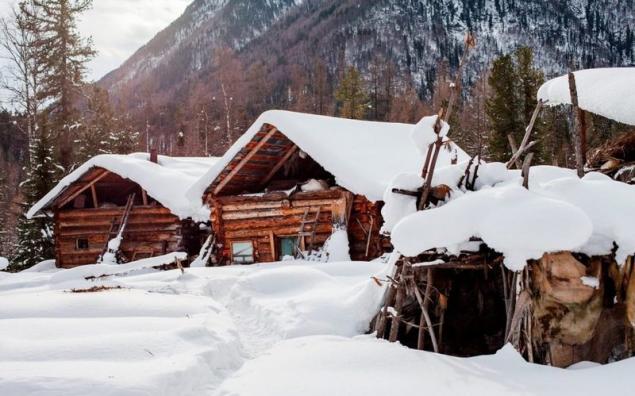
Hut Agafia
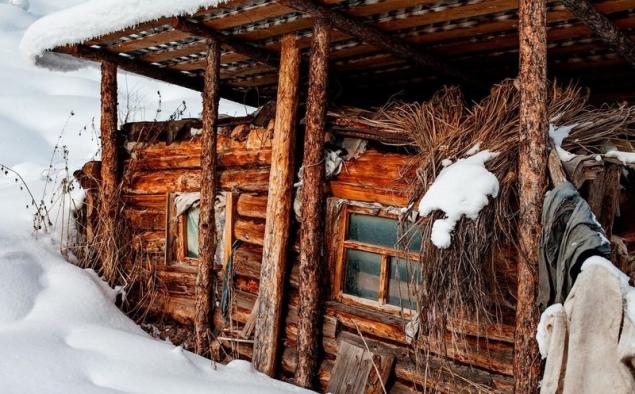
Karp Lykov was an old believer — a member of the fundamentalist Orthodox community administering religious rites in the form in which they existed before the XVII century. When the power was in the hands of the Soviets, separate communities of old believers, who fled in his time in Siberia from the persecution that began under Peter the great, began to move further out from civilization. During the repression of the 1930-ies, when attacks Christianity itself, on the outskirts of the old believer village Soviet patrol in front Lykov shot his brother. After that Carp have no doubt that you need to run. In 1936, gathering their belongings and taking with him some seeds, a Carp with his wife Akulina and two children — nine-year-old Savina and two year old Natalia — gone to the forest, building a hut by hut until they settled where the family found geologists. In 1940, in the taiga, Dmitry was born in 1943 Agatha. Everything that children know about the outside world, countries, cities, animals, other people, and they drew from the stories of adults and Bible stories.
But life in the forest, too, was not easy. For miles around there was not a soul, and Lykovs decades learned to make do with what was at their disposal: instead of Shoe sewn from birch bark galoshes; patched clothes, it has not yet decayed from old age, and new ones were sewn from hemp burlap. What little family he took with him while escaping a primitive spinning wheel, parts of a loom, two kettle, eventually fell into disrepair. When both kettle rusted, replaced them with a vessel made of birch bark, and cooking became more complicated. By the time the meeting with geologists diet of the family consisted mainly of potato patties with ground rye and hemp seeds.
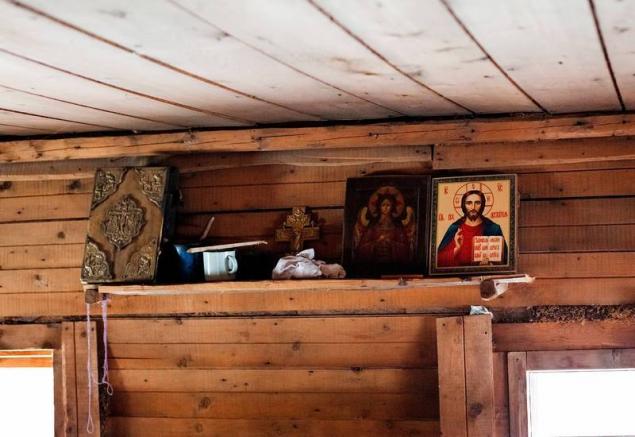
Fugitives always lived from hand to mouth. Use the meat and fur they began only in the late 1950s, when Dmitry has matured and learned to dig trapping, long chase prey in the mountains and became so hardy that they could all year round to hunt barefoot and sleep on a 40-degree frost. In lean years, when the crop was destroyed by animals or freezing, the family members ate leaves, roots, grass, bark and sprouts of potatoes. Exactly remember 1961, when, in June, the snow fell, and Akulina, wife of Carp, to give all the food to the children, died. The rest of the family saved the case. Finding in the garden sprouted grain rye, the family has built around him a fence and guarded day and night. Spike brought 18 grains, of which a few years was reduced rye crops.
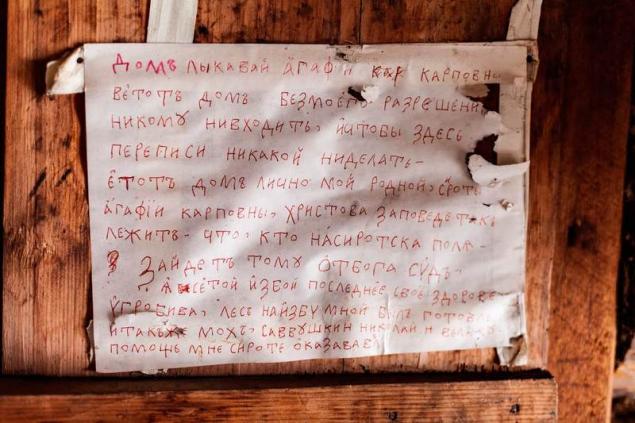
Notes on the front door with a warning for the intruders. Writes and speaks Agafya in the old Slavonic language
Scientists were struck by the curiosity and abilities of the men who for so long were in isolation. Due to the fact that the youngest in the family, Agatha, spoke in a singsong voice and stretched simple words into the complex, some guests Lykov decided at first that she was mentally retarded, and very wrong. In a family where there were no calendars and clocks, she was responsible for one of the most difficult tasks for many years kept count of time.
Old Carp in its 80th year with interest reacted to all the technical innovations he enthusiastically took the news of launching satellites, saying that they noticed a change even in the 1950s, when "the stars began soon to sky walk", and was delighted with transparent cellophane packaging, "Lord, what have fabricated: glass and wrinkled!"
But the most progressive member of the family and a favorite of geologists was Dmitry, a connoisseur of the taiga, who managed to build in the cabin stove and to weave birch bark boxes, which the family kept going. For many years, day in and day independently of the planing boards out of logs, he long watched with interest the rapid operation of the circular saw and lathe that I saw in the camp of geologists.
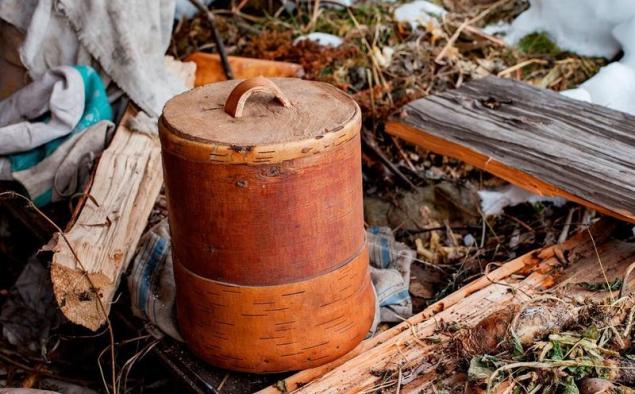
All life has long been a modern, utensils, all too civilized: enamelled buckets, pots. The smell in the house, even the chopper is, and on the street the thermometer hangs. Old things (in addition to the icons) — birch bark basket, bow saw and axe forged
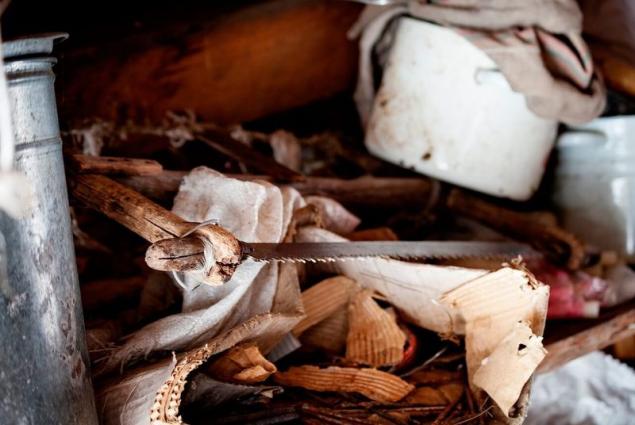
Once on the decades of modernity divorced from the will of the head of the family and circumstances Lykovs finally started to join the progress. At first they adopted from the geologists only salt that in their diet has not been all 40 years of his life in the forest. Gradually agreed to take forks, knives, hooks, grain, pen, paper and an electric torch. Every innovation they accepted reluctantly, but the TV is "sinful thing" with which they are faced in the camp of geologists has proved to be an irresistible temptation. Journalist Vasily Peskov, who managed a lot of time to spend close to Lykov, recalled how the family was drawn to the screen during their rare visits to the camp: "Karp Osipovich sits right in front of the screen. Agatha looks up, sticking his head out the door. The sin she committed to pray for forgiveness right away — pasache, baptized and again to stick his head out. The old man after praying diligently and once and for all".
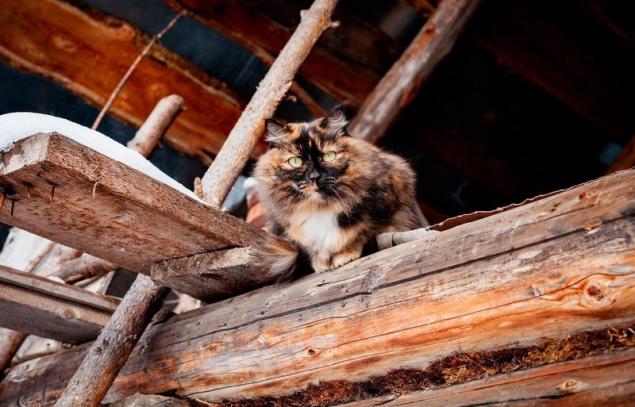
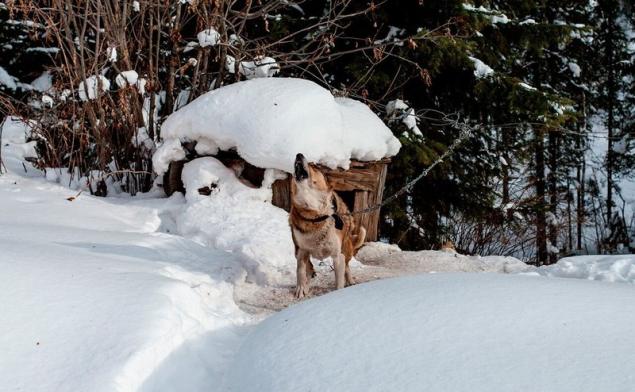
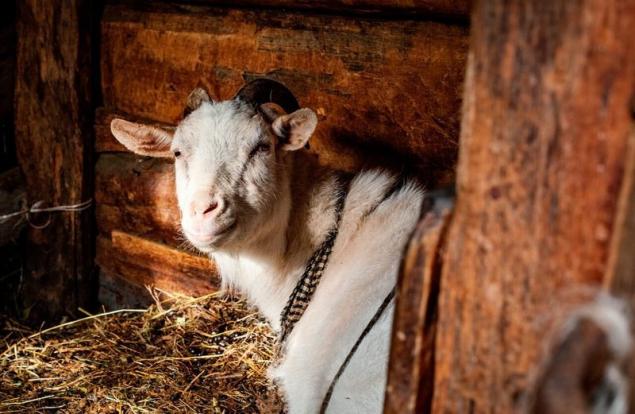
Agafya Karpovna complained that the goats do not give milk in winter and no milk it is bad. The reserve staff immediately called my colleagues from the Kemerovo region who also plan to visit the recluse in the coming days, and asked them to numerosity whole milk. Powdered milk, condensed milk and other store-bought packaged products tainica does not eat. Especially it scares the image of the barcode
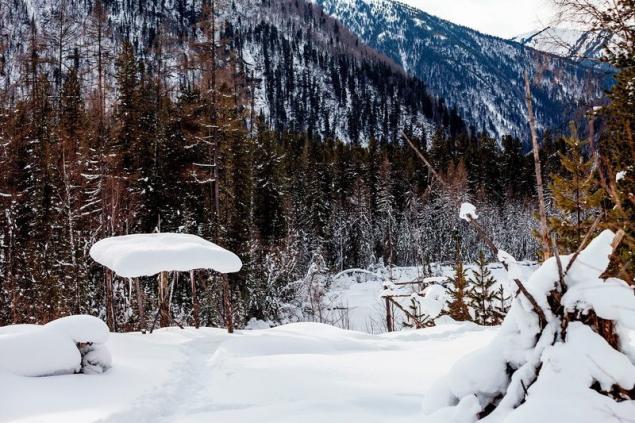
The world Agafia's not more than one square kilometer: on the one hand, a wild river Erinet, on the other steep mountains and impenetrable forests stretching to the horizon. Only North Agafya is a little removed from his hut and comes to a meadow, where she cuts the grass and branches for their goats
It seemed that the acquaintance with the geologists and their household gifts gave the family a chance at survival. As often happens in life, everything happened exactly the opposite: in the fall of 1981, three of the four children of Carp did not. Senior, Savin and Natalia died of kidney failure resulting from many years of severe dieting. Then from pneumonia died Dmitry is quite likely that the infection he contracted geologists. Before the death of Dmitry refused their offer to transport him to the hospital: "this is not possible, — he whispered before he died. — As God wills, I will live."
Survivors Karp and Agafia geologists tried to convince to go back to relatives living in villages. In response Lykovs only rebuilt the old hut, but my native place to leave refused.
Also interesting: Conservatives know the secrets of longevity
What is it like 14 years living alone on the island away from the mainland (10 photos)
In 1988, did not Carp. After burying his father on the hillside, Agatha returned to the cabin. Lord willing, she will live said helped her to geologists.
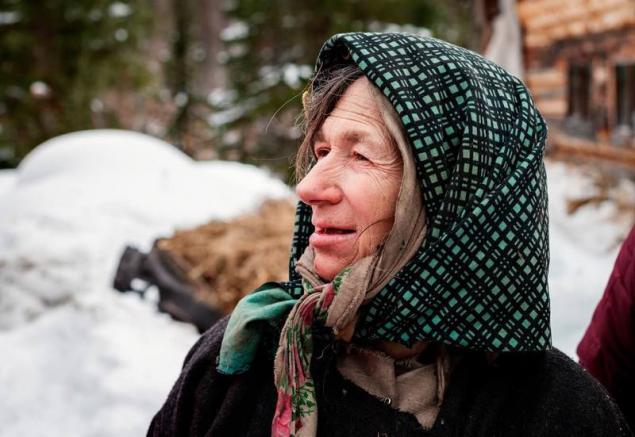
And so it happened: the last child of the forest, a quarter century later, she continues to live alone on the mountain above the Abakan.published
Author: Anna Kashcheeva
Photo: Denis Mukimov
Source: birdinflight.com/ru/mir/20161124-russian-hermits-in-taiga.html
Why they fled from civilization and how to survive a collision with it?
Thirteen million square kilometers of wild Siberian nature seem a little suitable place for life: the endless forests, rivers, wolves, bears, and almost complete solitude. But despite this, in 1978, flying over the taiga in search of a place for heading the teams of geologists, a helicopter pilot discovered here traces of human settlements. At a height of about 2 meters along the slope and near the unnamed tributary of the Abakan river, separating between pine and larch trees was a cleared area that served as a kitchen garden. This place never before explored Soviet archives about living here the people were silent, and the nearest village was more than 250 kilometers from the mountain. To believe that somebody lives in there, it was almost impossible.

The gorge through which flows the river Abakan
After learning about the discovery of the pilot, a group of scientists sent here in search of iron ore, went off prospecting strangers in the forest could be a dangerous wild beast. Expanding on backpacks gifts for friends possible and in any case, checking the operation of the gun group led by geologist Galina Pismenskaya went to the site 15 kilometers from his camp.
The first meeting was exciting for both sides. When the researchers reached the goal, they saw a well-tended garden with potatoes, onions, turnips, and piles of rubbish around the taiga blackened by time and rain hut with a single window — sized pocket of a backpack. Pismenskaya recalled how from behind the door hesitantly and looked out the owner — an old man in an old shirt of burlap, patched trousers, with unkempt beard and disheveled hair, and, looking cautiously at the strangers, agreed to let them in the house.
The hut consisted of one cramped musty room, low, bloated and cold as a cellar. Her floor was covered in potato peelings and shells from the pine nuts, the ceiling was sagging. In such conditions for 40 years there lived five people.

Agatha was the only survivor of a large family of reclusive old believers, was found by geologists in 1978 in the Western Sayan mountains. The Lykov family lived in isolation since 1937. For years, the hermits tried to protect the family from the influence of the external environment, especially in relation to faith
In addition to the head of the family, old man, Karp Lykov, in the house lived two of his daughters and two sons. For 17 years prior to the meeting with the scientists here died from exhaustion, their mother, Akulina. Although it Carp sounded clearly, his children already spoke on his tongue, the distorted life of isolation. "When the sisters talked among themselves, the sounds of their voice was like a slow muffled cooing," recalled Pismenskaya. Younger children, born in the forest, had never met other people, older ones have forgotten that once lived a different life. Meeting with the scientists led them into a frenzy. At first they refused any treats — jam, bread and tea — muttering: "We don't!" It turned out that the bread is there to see and once tried only the head of the family. But gradually when adjusted, the savages were used to all the new friends and learned about new tech products, the appearance of which missed. Cleared up and the story of their settlement in the forest.

Hut Agafia

Karp Lykov was an old believer — a member of the fundamentalist Orthodox community administering religious rites in the form in which they existed before the XVII century. When the power was in the hands of the Soviets, separate communities of old believers, who fled in his time in Siberia from the persecution that began under Peter the great, began to move further out from civilization. During the repression of the 1930-ies, when attacks Christianity itself, on the outskirts of the old believer village Soviet patrol in front Lykov shot his brother. After that Carp have no doubt that you need to run. In 1936, gathering their belongings and taking with him some seeds, a Carp with his wife Akulina and two children — nine-year-old Savina and two year old Natalia — gone to the forest, building a hut by hut until they settled where the family found geologists. In 1940, in the taiga, Dmitry was born in 1943 Agatha. Everything that children know about the outside world, countries, cities, animals, other people, and they drew from the stories of adults and Bible stories.
But life in the forest, too, was not easy. For miles around there was not a soul, and Lykovs decades learned to make do with what was at their disposal: instead of Shoe sewn from birch bark galoshes; patched clothes, it has not yet decayed from old age, and new ones were sewn from hemp burlap. What little family he took with him while escaping a primitive spinning wheel, parts of a loom, two kettle, eventually fell into disrepair. When both kettle rusted, replaced them with a vessel made of birch bark, and cooking became more complicated. By the time the meeting with geologists diet of the family consisted mainly of potato patties with ground rye and hemp seeds.

Fugitives always lived from hand to mouth. Use the meat and fur they began only in the late 1950s, when Dmitry has matured and learned to dig trapping, long chase prey in the mountains and became so hardy that they could all year round to hunt barefoot and sleep on a 40-degree frost. In lean years, when the crop was destroyed by animals or freezing, the family members ate leaves, roots, grass, bark and sprouts of potatoes. Exactly remember 1961, when, in June, the snow fell, and Akulina, wife of Carp, to give all the food to the children, died. The rest of the family saved the case. Finding in the garden sprouted grain rye, the family has built around him a fence and guarded day and night. Spike brought 18 grains, of which a few years was reduced rye crops.

Notes on the front door with a warning for the intruders. Writes and speaks Agafya in the old Slavonic language
Scientists were struck by the curiosity and abilities of the men who for so long were in isolation. Due to the fact that the youngest in the family, Agatha, spoke in a singsong voice and stretched simple words into the complex, some guests Lykov decided at first that she was mentally retarded, and very wrong. In a family where there were no calendars and clocks, she was responsible for one of the most difficult tasks for many years kept count of time.
Old Carp in its 80th year with interest reacted to all the technical innovations he enthusiastically took the news of launching satellites, saying that they noticed a change even in the 1950s, when "the stars began soon to sky walk", and was delighted with transparent cellophane packaging, "Lord, what have fabricated: glass and wrinkled!"
But the most progressive member of the family and a favorite of geologists was Dmitry, a connoisseur of the taiga, who managed to build in the cabin stove and to weave birch bark boxes, which the family kept going. For many years, day in and day independently of the planing boards out of logs, he long watched with interest the rapid operation of the circular saw and lathe that I saw in the camp of geologists.

All life has long been a modern, utensils, all too civilized: enamelled buckets, pots. The smell in the house, even the chopper is, and on the street the thermometer hangs. Old things (in addition to the icons) — birch bark basket, bow saw and axe forged

Once on the decades of modernity divorced from the will of the head of the family and circumstances Lykovs finally started to join the progress. At first they adopted from the geologists only salt that in their diet has not been all 40 years of his life in the forest. Gradually agreed to take forks, knives, hooks, grain, pen, paper and an electric torch. Every innovation they accepted reluctantly, but the TV is "sinful thing" with which they are faced in the camp of geologists has proved to be an irresistible temptation. Journalist Vasily Peskov, who managed a lot of time to spend close to Lykov, recalled how the family was drawn to the screen during their rare visits to the camp: "Karp Osipovich sits right in front of the screen. Agatha looks up, sticking his head out the door. The sin she committed to pray for forgiveness right away — pasache, baptized and again to stick his head out. The old man after praying diligently and once and for all".



Agafya Karpovna complained that the goats do not give milk in winter and no milk it is bad. The reserve staff immediately called my colleagues from the Kemerovo region who also plan to visit the recluse in the coming days, and asked them to numerosity whole milk. Powdered milk, condensed milk and other store-bought packaged products tainica does not eat. Especially it scares the image of the barcode

The world Agafia's not more than one square kilometer: on the one hand, a wild river Erinet, on the other steep mountains and impenetrable forests stretching to the horizon. Only North Agafya is a little removed from his hut and comes to a meadow, where she cuts the grass and branches for their goats
It seemed that the acquaintance with the geologists and their household gifts gave the family a chance at survival. As often happens in life, everything happened exactly the opposite: in the fall of 1981, three of the four children of Carp did not. Senior, Savin and Natalia died of kidney failure resulting from many years of severe dieting. Then from pneumonia died Dmitry is quite likely that the infection he contracted geologists. Before the death of Dmitry refused their offer to transport him to the hospital: "this is not possible, — he whispered before he died. — As God wills, I will live."
Survivors Karp and Agafia geologists tried to convince to go back to relatives living in villages. In response Lykovs only rebuilt the old hut, but my native place to leave refused.
Also interesting: Conservatives know the secrets of longevity
What is it like 14 years living alone on the island away from the mainland (10 photos)
In 1988, did not Carp. After burying his father on the hillside, Agatha returned to the cabin. Lord willing, she will live said helped her to geologists.

And so it happened: the last child of the forest, a quarter century later, she continues to live alone on the mountain above the Abakan.published
Author: Anna Kashcheeva
Photo: Denis Mukimov
Source: birdinflight.com/ru/mir/20161124-russian-hermits-in-taiga.html

